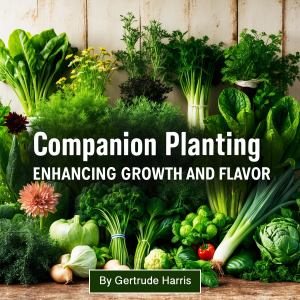

Companion Planting
Gertrude Harris
Companion planting is an age-old gardening technique that harnesses the natural relationships between plants to enhance growth, improve flavor, and reduce the need for chemical fertilizers and pesticides. Whether practiced by indigenous farmers through the Three Sisters method or by modern organic gardeners, this approach emphasizes balance and biodiversity in the garden.
At its core, companion planting is about understanding how plants interact with each other and their environment. Some plants release chemicals that deter pests, while others attract pollinators or beneficial insects. Certain crops improve soil conditions by fixing nitrogen or suppressing weeds. When planted together strategically, these plants create a mutually beneficial ecosystem that promotes healthier growth and increased yields.
Beyond the practical benefits, companion planting enhances the flavors of many fruits, vegetables, and herbs. Gardeners have long observed that basil planted near tomatoes intensifies their taste, while marigolds deter nematodes that can damage plant roots. These small yet powerful interactions reveal the intricate relationships that exist within nature and how we can use them to our advantage.
Duration - 1h 32m.
Author - Gertrude Harris.
Narrator - Jessica Roberts.
Published Date - Wednesday, 08 January 2025.
Copyright - © 2025 Gertrude Harris ©.
Location:
United States
Description:
Companion planting is an age-old gardening technique that harnesses the natural relationships between plants to enhance growth, improve flavor, and reduce the need for chemical fertilizers and pesticides. Whether practiced by indigenous farmers through the Three Sisters method or by modern organic gardeners, this approach emphasizes balance and biodiversity in the garden. At its core, companion planting is about understanding how plants interact with each other and their environment. Some plants release chemicals that deter pests, while others attract pollinators or beneficial insects. Certain crops improve soil conditions by fixing nitrogen or suppressing weeds. When planted together strategically, these plants create a mutually beneficial ecosystem that promotes healthier growth and increased yields. Beyond the practical benefits, companion planting enhances the flavors of many fruits, vegetables, and herbs. Gardeners have long observed that basil planted near tomatoes intensifies their taste, while marigolds deter nematodes that can damage plant roots. These small yet powerful interactions reveal the intricate relationships that exist within nature and how we can use them to our advantage. Duration - 1h 32m. Author - Gertrude Harris. Narrator - Jessica Roberts. Published Date - Wednesday, 08 January 2025. Copyright - © 2025 Gertrude Harris ©.
Language:
English
Opening Credits
Duration:00:00:06
1 companion planting
Duration:00:16:30
2 companion planting
Duration:00:16:01
3 companion planting
Duration:00:15:14
4 companion planting
Duration:00:15:53
5 companion planting
Duration:00:15:51
6 companion planting
Duration:00:12:34
Ending Credits
Duration:00:00:08